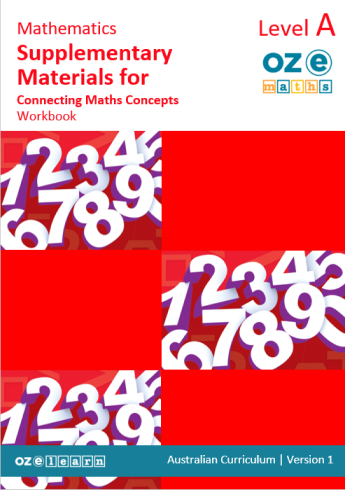Mathematics
Program Module
Overview
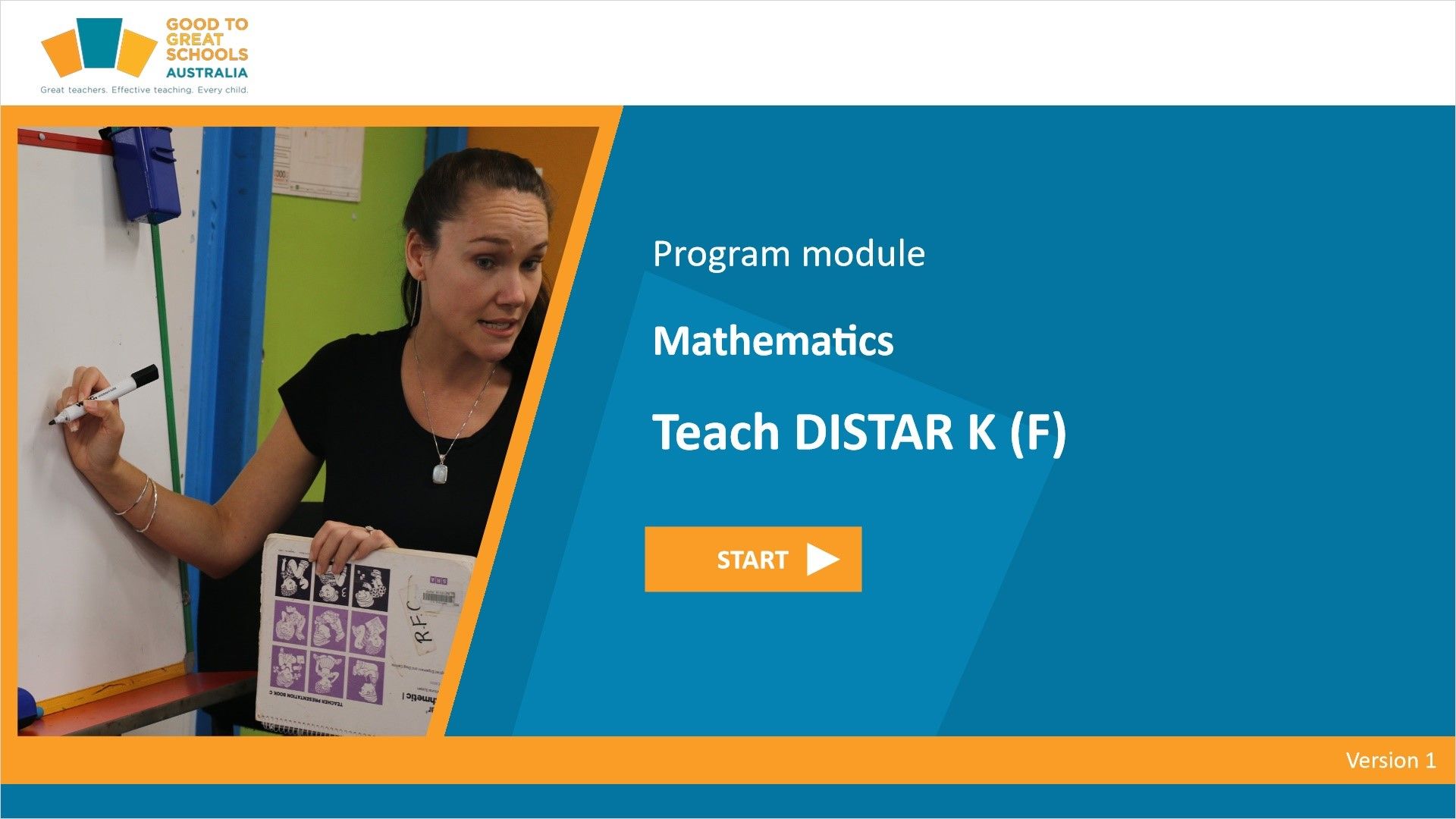
Teach DISTAR Arithmetic K (F)
DISTAR Arithmetic K (F) is a professional learning module for teachers and teaching assistants. In this module, participants will understand the rationale for using DISTAR Arithmetic K (F) and learn about the materials, placement testing, grouping and use of positive praise. They will also understand the progression of the learning tracks of DISTAR Arithmetic K (F) and potential problems, and learn how to correct specific mistakes.
Learning Intents
- Use instructional program scope and sequence charts to set learning goals that provide scaffolding and incremental challenges for students appropriate to their ability and goals (3.1.01).
- Implement lesson sequences with fidelity using knowledge of student learning, content and effective teaching strategies (3.1.02).
- Select and implement a variety of effective teaching strategies. Participate in program practice sessions to master teaching strategies (3.1.03).
- Demonstrate knowledge of effective teaching resources that are aligned with the core programs and further engage students in their learning (3.1.04).
- Incorporate feedback based on observations to implement and improve a range of verbal and nonverbal communication strategies to support student engagement during small-group instruction (3.1.05).
- Implement re-teaching or skipping of direct instruction lessons based on group mastery data and in collaboration with instruction coach. Review direct instruction student mastery data daily to ensure groups stay at mastery (3.1.08).
- Implement lesson sequences with fidelity, maintaining student engagement and promoting learning.
- Review student work daily to ensure all students are at mastery (3.1.09).
- Implement effective teaching techniques to develop problem-solving skills in students (3.1.10).
- Demonstrate knowledge of effective teaching strategies and practices (3.2.01).
- Understand the underlying organisational principles of mastery learning programs (3.2.02).
- Use curriculum, assessment and reporting knowledge to collect student mastery data for analysis during problem-solving sessions (3.2.03).
- Know and understand effective teaching strategies for developing strong literacy and numeracy skills for all students (3.2.05).
- Implement all parts of direct and explicit instruction lessons (3.2.07).
- Plan group instruction based on mastery data and program guidelines. Implement direct and explicit instruction lessons with fidelity (3.2.08).
- Understand how to group students and maximise instructional time to manage classroom activities. Apply classroom practices across all activities by setting clear behavioural expectations and facilitating routines, orderly transitions and bell-to-bell teaching (3.4.02).
- Demonstrate knowledge of effective instructional behaviour strategies. Use evidence-based practices to support positive behaviour (3.4.03).
- Demonstrate understanding of how to use feedback during the implementation of Effective Instruction curricula as well as in-program Mastery Tests to assess student learning program decisions (3.6.01).
- Demonstrate an understanding of the purpose of providing timely and appropriate feedback to students about their learning during instruction and independent work by using appropriate corrective feedback and effective teaching procedures for diagnosis and remediation of curriculum-related skills (3.6.02).
- Demonstrate understanding of objective assessment anchored to the implementation of effective teaching curricula and its application to support consistent and comparable judgements of student learning (3.6.03).
- Demonstrate the capacity to interpret student assessment data from informal in-program assessments and related independent progress monitoring to evaluate student learning and modify teaching practice (3.6.04).
- Understand the importance of keeping accurate and reliable records of student achievement (3.6.05).
- Plan instructional time to implement mastery tests as indicated in the program. Implement in-program and out-of-program assessments to evaluate student mastery levels. Review mastery test data to determine individual and group mastery (3.6.06).
Prerequisite
- Learn Effective Teaching Essentials
- Deliver Direct Instruction.
Duration
- 12 Lessons.
Assessment
Assessment has three stages:
Test: Knowledge and skills taught in the lessons
Appraisal: Practical application in practicing knowledge and skills learned in the lessons
Mastery evaluation: Delivery with students of the knowledge and skills learned in the lessons.
Certification
Participants are eligible for certification based on attendance and completion of assessment requirements for each module.
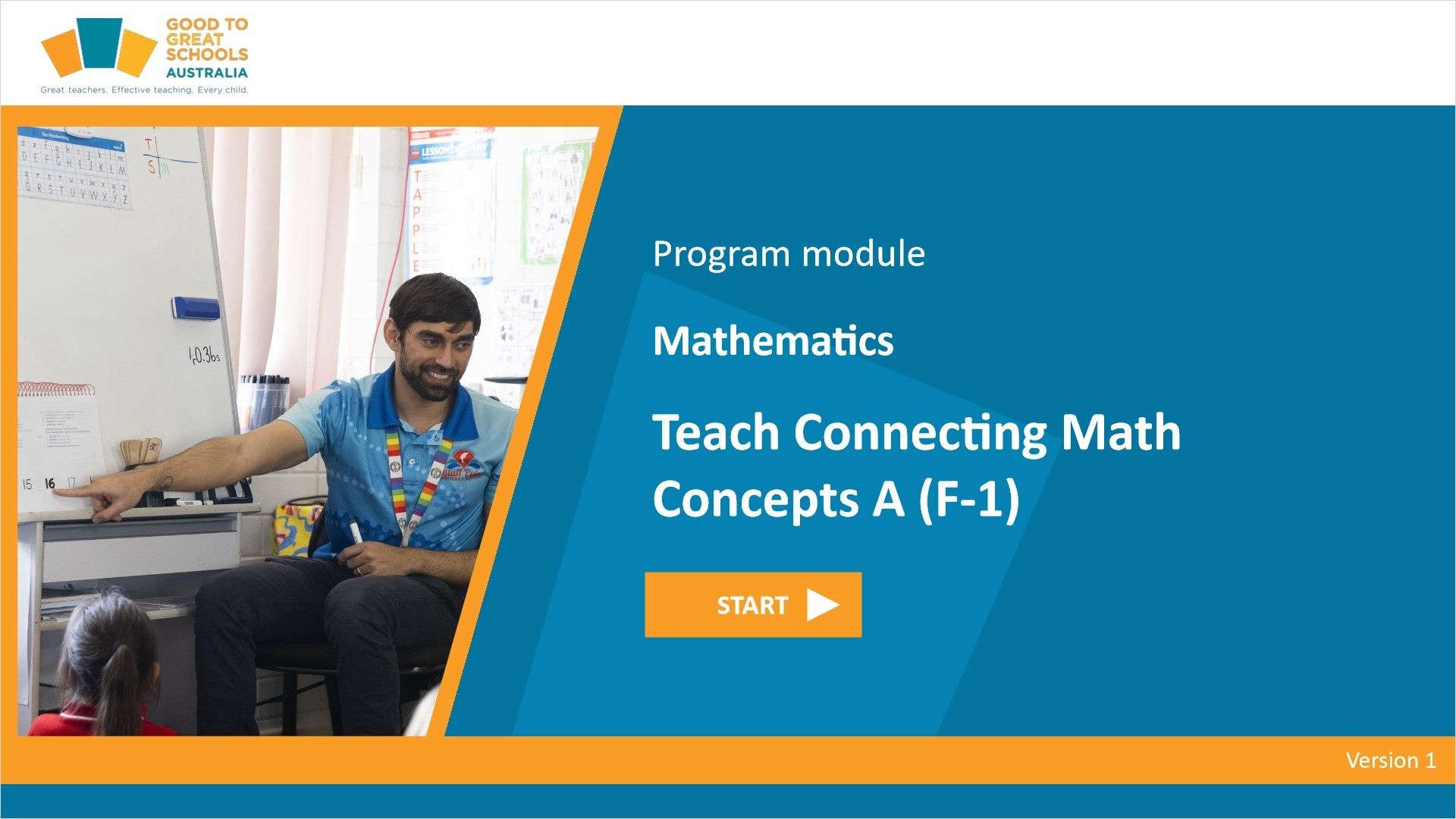
Teach Connecting Math Concepts A (F–1)
CMC – A is a professional learning module for teachers and teaching assistants. In this module,
participants will understand the rationale for using CMC – A, how to teach exercises, how and when to use the accompanying correction procedures and how to conduct workbook exercises and work checks.
They will also learn how to conduct mastery tests, how to record assessment data and how to motivate
students.
Learning Intents
- Use instructional program scope and sequence charts to set learning goals that provide scaffolding and incremental challenges for students appropriate to their ability and goals (3.1.01).
- Implement lesson sequences with fidelity using knowledge of student learning, content and effective teaching strategies (3.1.02).
- Select and implement a variety of effective teaching strategies. Participate in program practice sessions to master teaching strategies (3.1.03).
- Demonstrate knowledge of effective teaching resources that are aligned with the core programs and further engage students in their learning (3.1.04).
- Incorporate feedback based on observations to implement and improve a range of verbal and nonverbal communication strategies to support student engagement during small-group instruction (3.1.05).
- Implement re-teaching or skipping of direct instruction lessons based on group mastery data and in collaboration with instruction coach. Review direct instruction student mastery data daily to ensure groups stay at mastery (3.1.08).
- Implement lesson sequences with fidelity, maintaining student engagement and promoting learning.
- Review student work daily to ensure all students are at mastery (3.1.09).
- Implement effective teaching techniques to develop problem-solving skills in students (3.1.10).
- Demonstrate knowledge of effective teaching strategies and practices (3.2.01).
- Understand the underlying organisational principles of mastery learning programs (3.2.02).
- Use curriculum, assessment and reporting knowledge to collect student mastery data for analysis during problem-solving sessions (3.2.03).
- Know and understand effective teaching strategies for developing strong literacy and numeracy skills for all students (3.2.05).
- Implement all parts of direct and explicit instruction lessons (3.2.07).
- Plan group instruction based on mastery data and program guidelines. Implement direct and explicit instruction lessons with fidelity (3.2.08).
- Understand how to group students and maximise instructional time to manage classroom activities. Apply classroom practices across all activities by setting clear behavioural expectations and facilitating routines, orderly transitions and bell-to-bell teaching (3.4.02).
- Demonstrate knowledge of effective instructional behaviour strategies. Use evidence-based practices to support positive behaviour (3.4.03).
- Demonstrate understanding of how to use feedback during the implementation of Effective Instruction curricula as well as in-program Mastery Tests to assess student learning program decisions (3.6.01).
- Demonstrate an understanding of the purpose of providing timely and appropriate feedback to students about their learning during instruction and independent work by using appropriate corrective feedback and effective teaching procedures for diagnosis and remediation of curriculum-related skills (3.6.02).
- Demonstrate understanding of objective assessment anchored to the implementation of effective teaching curricula and its application to support consistent and comparable judgements of student learning (3.6.03).
- Demonstrate the capacity to interpret student assessment data from informal in-program assessments and related independent progress monitoring to evaluate student learning and modify teaching practice (3.6.04).
- Understand the importance of keeping accurate and reliable records of student achievement (3.6.05).
- Plan instructional time to implement mastery tests as indicated in the program. Implement in-program and out-of-program assessments to evaluate student mastery levels. Review mastery test data to determine individual and group mastery (3.6.06).
Prerequisite
- Learn Effective Teaching Essential.
- Deliver Direct Instruction.
Duration
- 12 Lessons.
Assessment
Assessment has three stages:
Test: Knowledge and skills taught in the lessons
Appraisal: Practical application in practicing knowledge and skills learned in the lessons
Mastery evaluation: Delivery with students of the knowledge and skills learned in the lessons.
Certification
Participants are eligible for certification based on attendance and completion of assessment requirements for each module.
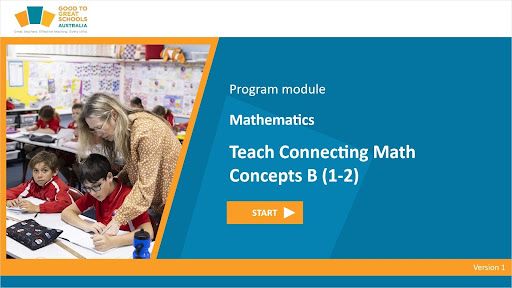
Teach Connecting Math Concepts B (1–2)
CMC – B is a professional learning module for teachers and teaching assistants. In this module, participants will understand the rationale for using CMC – B and learn how Oz-e-maths connects to Connecting Math Concepts. They will also understand the progression of the eight learning tracks of Connecting Math Concepts Level B and the potential problems and learn how to correct specific mistakes.
Learning Intents
- Use instructional program scope and sequence charts to set learning goals that provide scaffolding and incremental challenges for students appropriate to their ability and goals (3.1.01).
- Implement lesson sequences with fidelity using knowledge of student learning, content and effective teaching strategies (3.1.02).
- Select and implement a variety of effective teaching strategies. Participate in program practice sessions to master teaching strategies (3.1.03).
- Demonstrate knowledge of effective teaching resources that are aligned with the core programs and further engage students in their learning (3.1.04).
- Incorporate feedback based on observations to implement and improve a range of verbal and non-verbal communication strategies to support student engagement during small-group instruction (3.1.05).
- Implement re-teaching or skipping of direct instruction lessons, based on group mastery data, and in collaboration with instruction coach. Review direct instruction student mastery data daily to ensure groups stay at mastery (3.1.08).
- Implement lesson sequences with fidelity, maintaining student engagement and promoting learning. Review student work daily to ensure all students are at mastery (3.1.09).
- Implement effective teaching techniques to develop problem-solving skills in students (3.1.10).
- Demonstrate knowledge of effective teaching strategies and practices (3.2.01).
- Understand the underlying organisational principles of mastery learning programs (3.2.02).
- Use curriculum, assessment and reporting knowledge to collect student mastery data for analysis during problem-solving sessions (3.2.03).
- Know and understand effective teaching strategies for developing strong literacy and numeracy skills for all students (3.2.05).
- Implement all parts of direct and explicit instruction lessons (3.2.07).
- Plan group instruction based on mastery data and program guidelines. Implement direct and explicit instruction lessons with fidelity (3.2.08).
- Understand how to group students and maximise instructional time to manage classroom activities. Apply classroom practices across all activities by setting clear behavioural expectations and facilitating routines, orderly transitions and bell-to-bell teaching (3.4.02).
- Demonstrate knowledge of effective instructional behaviour strategies. Use evidence-based practices to support positive behaviour (3.4.03).
- Demonstrate understanding of how to use feedback during the implementation of Effective Instruction curricula as well as in-program Mastery Tests to assess student learning program decisions (3.6.01).
- Demonstrate an understanding of the purpose of providing timely and appropriate feedback to students about their learning during instruction and independent work by using appropriate corrective feedback and effective teaching procedures for diagnosis and remediation of curriculum-related skills (3.6.02).
- Demonstrate understanding of objective assessment anchored to the implementation of effective teaching curricula and its application to support consistent and comparable judgements of student learning (3.6.03).
- Demonstrate the capacity to interpret student assessment data from informal in-program assessments and related independent progress monitoring to evaluate student learning and modify teaching practice (3.6.04).
- Understand the importance of keeping accurate and reliable records of student achievement (3.6.05).
- Plan instructional time to implement mastery tests as indicated in the program. Implement in-program and out-of-program assessments to evaluate student mastery levels. Review mastery test data to determine individual and group mastery (3.6.06).
Prerequisite
- Learn Effective Teaching Essentials
- Deliver Direct Instruction.
Duration
- 12 Lessons.
Assessment
- Assessment has three stages:
- Test: Knowledge and skills taught in the lessons
- Appraisal: Practical application in practicing knowledge and skills learned in the lessons
- Mastery evaluation: Delivery with students of the knowledge and skills learned in the lessons.
Certification
Assessment has three stages:
- Test: Knowledge and skills taught in the lessons.
- Appraisal: Practical application in practicing knowledge and skills learned in the lessons.
- Mastery evaluation: Delivery with students of the knowledge and skills learned in the lessons.
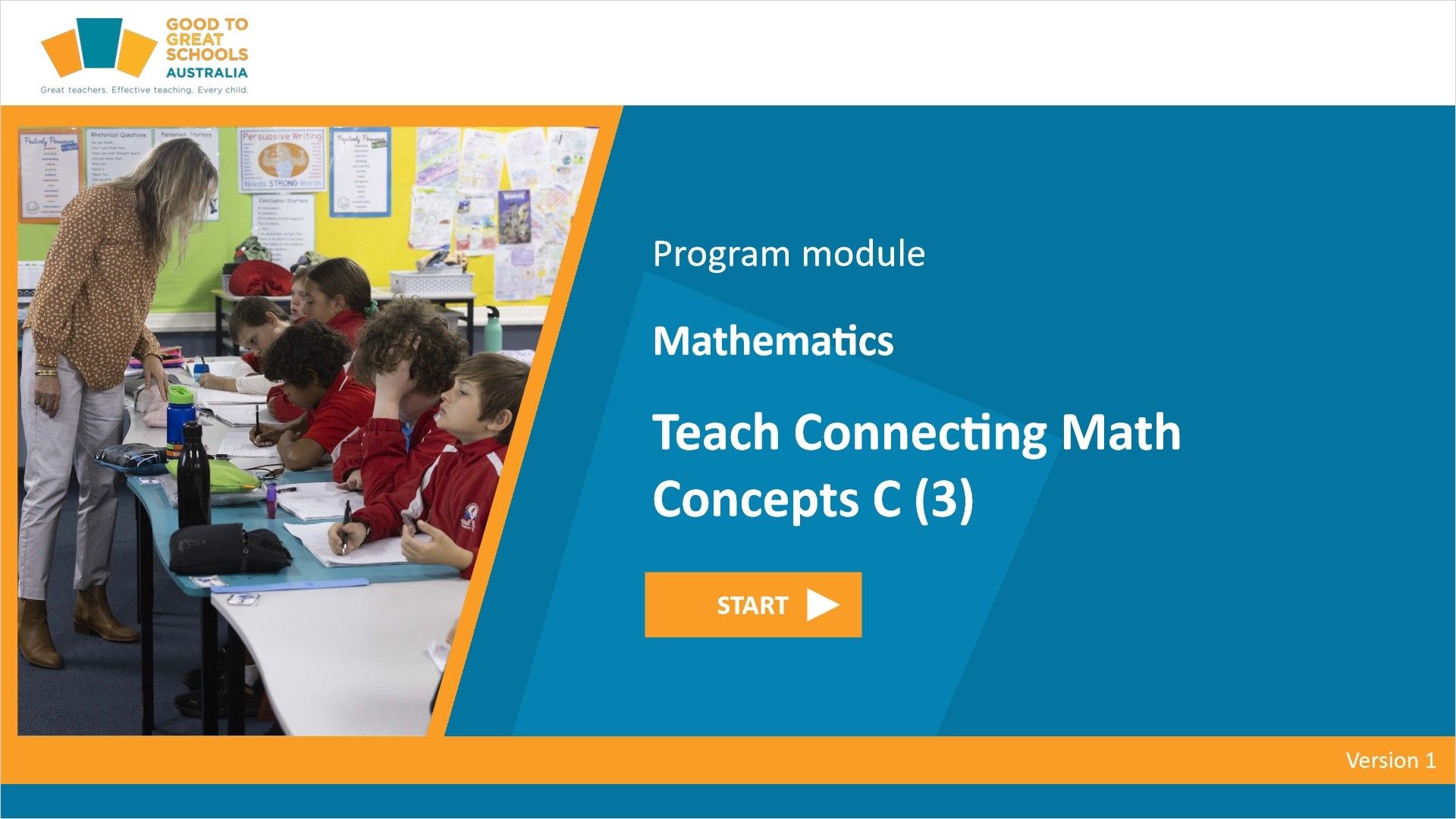
Teach Connecting Math Concepts C (3)
CMC – C is a professional learning module for teachers and teaching assistants. In this module, participants will understand and apply techniques needed for teaching Connecting Math Concepts Comprehensive Edition Level C. They will also learn how to conduct mastery tests and record assessment data.
Learning Intents
- Use instructional program scope and sequence charts to set learning goals that provide scaffolding and incremental challenges for students appropriate to their ability and goals (3.1.01).
- Implement lesson sequences with fidelity using knowledge of student learning, content and effective teaching strategies (3.1.02).
- Select and implement a variety of effective teaching strategies. Participate in program practice sessions to master teaching strategies (3.1.03).
- Demonstrate knowledge of effective teaching resources that are aligned with the core programs and further engage students in their learning (3.1.04).
- Incorporate feedback based on observations to implement and improve a range of verbal and non-verbal communication strategies to support student engagement during small-group instruction (3.1.05).
- Implement re-teaching or skipping of direct instruction lessons based on group mastery data and in collaboration with instruction coach. Review direct instruction student mastery data daily to ensure groups stay at mastery (3.1.08).
- Implement lesson sequences with fidelity, maintaining student engagement and promoting learning.
- Review student work daily to ensure all students are at mastery (3.1.09).
- Implement effective teaching techniques to develop problem-solving skills in students (3.1.10).
- Demonstrate knowledge of effective teaching strategies and practices (3.2.01).
- Understand the underlying organisational principles of mastery learning programs (3.2.02).
- Use curriculum, assessment and reporting knowledge to collect student mastery data for analysis during problem-solving sessions (3.2.03).
- Know and understand effective teaching strategies for developing strong literacy and numeracy skills for all students (3.2.05).
- Implement all parts of direct and explicit instruction lessons (3.2.07).
- Plan group instruction based on mastery data and program guidelines. Implement direct and explicit instruction lessons with fidelity (3.2.08).
- Understand how to group students and maximise instructional time to manage classroom activities. Apply classroom practices across all activities by setting clear behavioural expectations and facilitating routines, orderly transitions and bell-to-bell teaching (3.4.02).
- Demonstrate knowledge of effective instructional behaviour strategies. Use evidence-based practices to support positive behaviour (3.4.03).
- Demonstrate understanding of how to use feedback during the implementation of Effective Instruction curricula as well as in-program Mastery Tests to assess student learning program decisions (3.6.01).
- Demonstrate an understanding of the purpose of providing timely and appropriate feedback to students about their learning during instruction and independent work by using appropriate corrective feedback and effective teaching procedures for diagnosis and remediation of curriculum-related skills (3.6.02).
- Demonstrate understanding of objective assessment anchored to the implementation of effective teaching curricula and its application to support consistent and comparable judgements of student learning (3.6.03).
- Demonstrate the capacity to interpret student assessment data from informal in-program assessments and related independent progress monitoring to evaluate student learning and modify teaching practice (3.6.04).
- Understand the importance of keeping accurate and reliable records of student achievement (3.6.05).
- Plan instructional time to implement mastery tests as indicated in the program. Implement in-program and out-of-program assessments to evaluate student mastery levels. Review mastery test data to determine individual and group mastery (3.6.06).
Prerequisite
- Learn Effective Teaching Essentials
- Deliver Direct Instruction.
Duration
- 12 Lessons.
Assessment
Assessment has three stages:
- Test: Knowledge and skills taught in the lessons
- Appraisal: Practical application in practicing knowledge and skills learned in the lessons
- Mastery evaluation: Delivery with students of the knowledge and skills learned in the lessons.
Certification
Participants are eligible for certification based on attendance and completion of assessment requirements for each module.
- Certificate of Attendance: Complete online training and knowledge and skills tests.
- Certificate of Participation: Pass knowledge and skills video Appraisal.
- Certificate of Achievement: Pass knowledge and skills video Mastery evaluation.
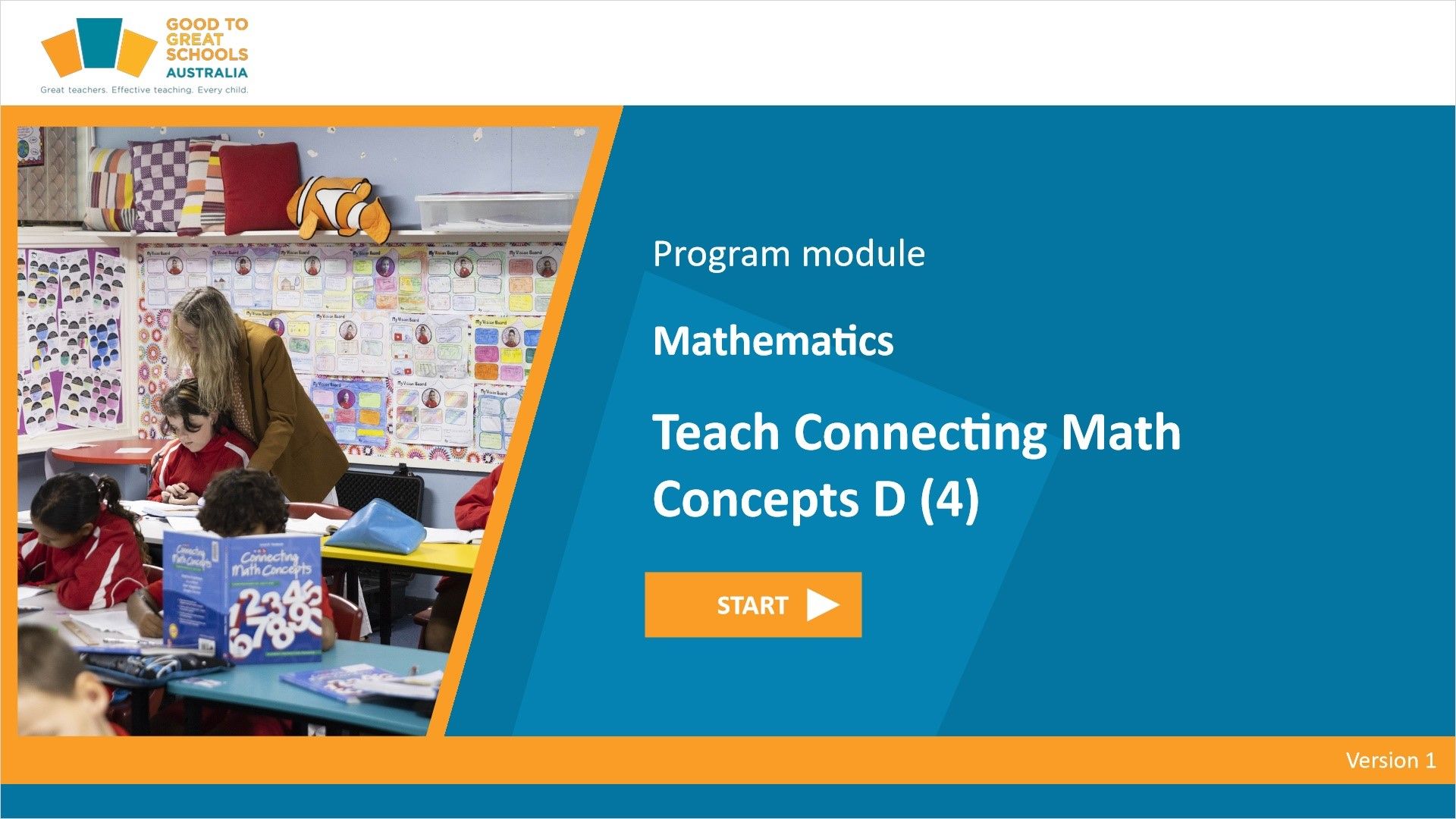
Teach Connecting Math Concepts D (4)
CMC – D is a professional learning module for teachers and teaching assistants. In this module, participants will understand and apply techniques needed for teaching Connecting Math Concepts Comprehensive Edition Level D. They will also learn how to conduct mastery tests and record assessment data.
Learning Intents
- Use instructional program scope and sequence charts to set learning goals that provide scaffolding and incremental challenges for students appropriate to their ability and goals (3.1.01).
- Implement lesson sequences with fidelity using knowledge of student learning, content and effective teaching strategies (3.1.02).
- Select and implement a variety of effective teaching strategies. Participate in program practice sessions to master teaching strategies (3.1.03).
- Demonstrate knowledge of effective teaching resources that are aligned with the core programs and further engage students in their learning (3.1.04).
- Incorporate feedback based on observations to implement and improve a range of verbal and non-verbal communication strategies to support student engagement during small-group instruction (3.1.05).
- Implement re-teaching or skipping of direct instruction lessons based on group mastery data and in collaboration with instruction coach. Review direct instruction student mastery data daily to ensure groups stay at mastery (3.1.08).
- Implement lesson sequences with fidelity, maintaining student engagement and promoting learning.
- Review student work daily to ensure all students are at mastery (3.1.09).
- Implement effective teaching techniques to develop problem-solving skills in students (3.1.10).
- Demonstrate knowledge of effective teaching strategies and practices (3.2.01).
- Understand the underlying organisational principles of mastery learning programs (3.2.02).
- Use curriculum, assessment and reporting knowledge to collect student mastery data for analysis during problem-solving sessions (3.2.03).
- Know and understand effective teaching strategies for developing strong literacy and numeracy skills for all students (3.2.05).
- Implement all parts of direct and explicit instruction lessons (3.2.07).
- Plan group instruction based on mastery data and program guidelines. Implement direct and explicit instruction lessons with fidelity (3.2.08).
- Understand how to group students and maximise instructional time to manage classroom activities.
- Apply classroom practices across all activities by setting clear behavioural expectations and facilitating routines, orderly transitions and bell-to-bell teaching (3.4.02).
- Demonstrate knowledge of effective instructional behaviour strategies. Use evidence-based practices to support positive behaviour (3.4.03).
- Demonstrate understanding of how to use feedback during the implementation of Effective Instruction curricula as well as in-program Mastery Tests to assess student learning program decisions (3.6.01).
- Demonstrate an understanding of the purpose of providing timely and appropriate feedback to students about their learning during instruction and independent work by using appropriate corrective feedback and effective teaching procedures for diagnosis and remediation of curriculum-related skills (3.6.02).
- Demonstrate understanding of objective assessment anchored to the implementation of effective teaching curricula and its application to support consistent and comparable judgements of student learning (3.6.03).
- Demonstrate the capacity to interpret student assessment data from informal in-program assessments and related independent progress monitoring to evaluate student learning and modify teaching practice (3.6.04).
- Understand the importance of keeping accurate and reliable records of student achievement (3.6.05).
- Plan instructional time to implement mastery tests as indicated in the program. Implement in-program and out-of-program assessments to evaluate student mastery levels. Review mastery test data to determine individual and group mastery (3.6.06).
Prerequisite
- Learn Effective Teaching Essentials
- Deliver Direct Instruction.
Duration
- 12 Lessons.
Assessment
Assessment has three stages:
- Test: Knowledge and skills taught in the lessons
- Appraisal: Practical application in practicing knowledge and skills learned in the lessons
- Mastery evaluation: Delivery with students of the knowledge and skills learned in the lessons.
Certification
Participants are eligible for certification based on attendance and completion of assessment requirements for each module.
- Certificate of Attendance: Complete online training and knowledge and skills tests.
- Certificate of Participation: Pass knowledge and skills video Appraisal.
- Certificate of Achievement: Pass knowledge and skills video Mastery evaluation.
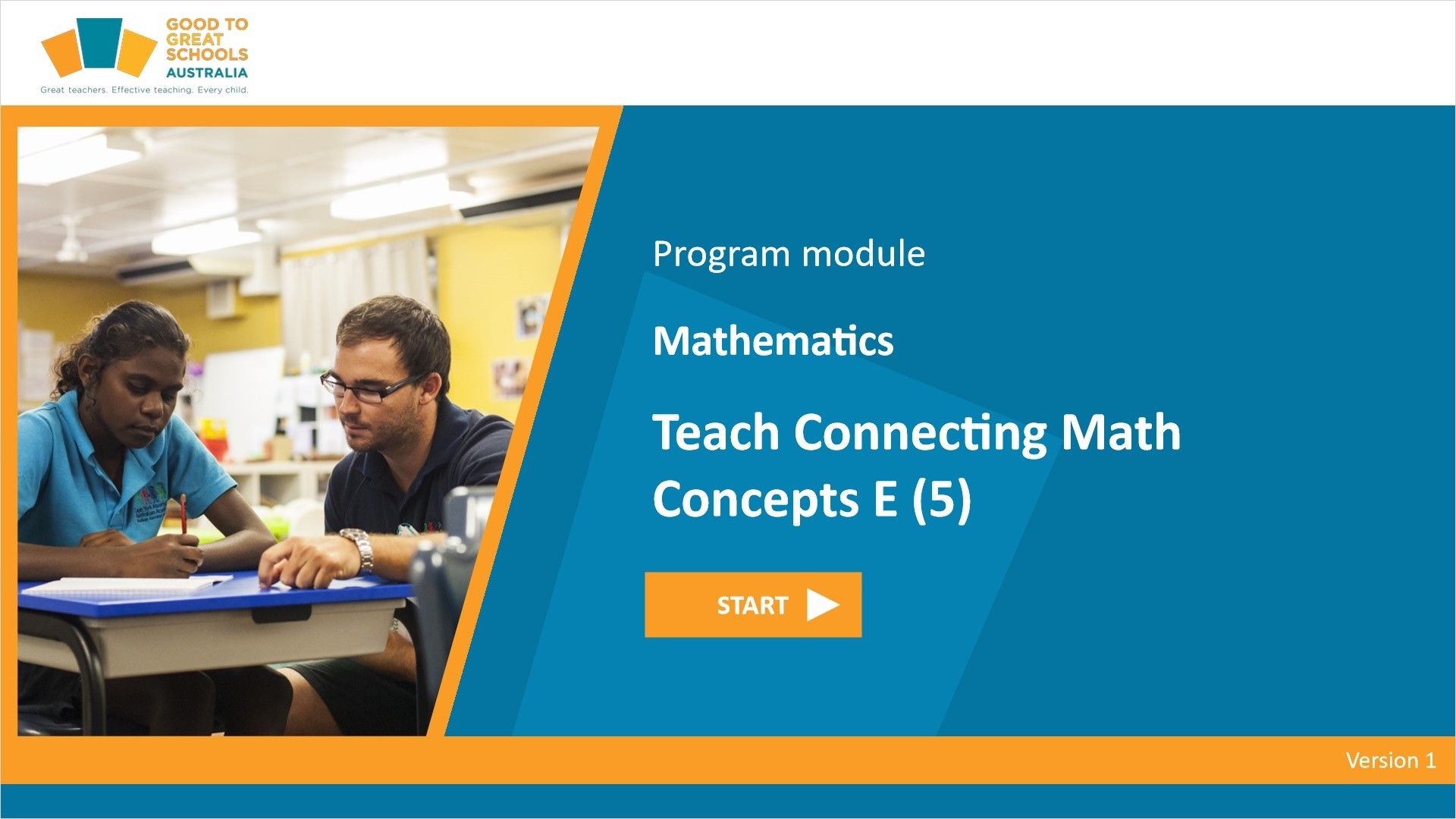
Teach Connecting Math Concepts E (5)
CMC – E is a professional learning module for teachers and teaching assistants. In this module, participants will understand the rationale for using CMC – E and learn how Oz-e-maths connects to Connecting Math Concepts. They will also understand the progression of the eight learning tracks of Connecting Math Concepts Level E and the potential problems and learn how to correct specific mistakes.
Learning Intents
- Use instructional program scope and sequence charts to set learning goals that provide scaffolding and incremental challenges for students appropriate to their ability and goals (3.1.01).
- Implement lesson sequences with fidelity using knowledge of student learning, content and effective teaching strategies (3.1.02).
- Select and implement a variety of effective teaching strategies. Participate in program practice sessions to master teaching strategies (3.1.03).
- Demonstrate knowledge of effective teaching resources that are aligned with the core programs and further engage students in their learning (3.1.04).
- Incorporate feedback based on observations to implement and improve a range of verbal and non-verbal communication strategies to support student engagement during small-group instruction (3.1.05).
- Implement re-teaching or skipping of direct instruction lessons based on group mastery data and in collaboration with instruction coach. Review direct instruction student mastery data daily to ensure groups stay at mastery (3.1.08).
- Implement lesson sequences with fidelity, maintaining student engagement and promoting learning.
- Review student work daily to ensure all students are at mastery (3.1.09).
- Implement effective teaching techniques to develop problem-solving skills in students (3.1.10).
- Demonstrate knowledge of effective teaching strategies and practices (3.2.01).
- Understand the underlying organisational principles of mastery learning programs (3.2.02).
- Use curriculum, assessment and reporting knowledge to collect student mastery data for analysis during problem-solving sessions (3.2.03).
- Know and understand effective teaching strategies for developing strong literacy and numeracy skills for all students (3.2.05).
- Implement all parts of direct and explicit instruction lessons (3.2.07).
- Plan group instruction based on mastery data and program guidelines. Implement direct and explicit instruction lessons with fidelity (3.2.08).
- Understand how to group students and maximise instructional time to manage classroom activities. Apply classroom practices across all activities by setting clear behavioural expectations and facilitating routines, orderly transitions and bell-to-bell teaching (3.4.02).
- Demonstrate knowledge of effective instructional behaviour strategies. Use evidence-based practices to support positive behaviour (3.4.03).
- Demonstrate understanding of how to use feedback during the implementation of Effective Instruction curricula as well as in-program Mastery Tests to assess student learning program decisions (3.6.01).
- Demonstrate an understanding of the purpose of providing timely and appropriate feedback to students about their learning during instruction and independent work by using appropriate corrective feedback and effective teaching procedures for diagnosis and remediation of curriculum-related skills (3.6.02).
- Demonstrate understanding of objective assessment anchored to the implementation of effective teaching curricula and its application to support consistent and comparable judgements of student learning (3.6.03).
- Demonstrate the capacity to interpret student assessment data from informal in-program assessments and related independent progress monitoring to evaluate student learning and modify teaching practice (3.6.04).
- Understand the importance of keeping accurate and reliable records of student achievement (3.6.05).
- Plan instructional time to implement mastery tests as indicated in the program. Implement in-program and out-of-program assessments to evaluate student mastery levels. Review mastery test data to determine individual and group mastery (3.6.06).
Prerequisite
- Learn Effective Teaching Essentials
- Deliver Direct Instruction.
Duration
- 12 Lessons.
Assessment
Assessment has three stages:
Certification
Participants are eligible for certification based on attendance and completion of assessment requirements for each module.
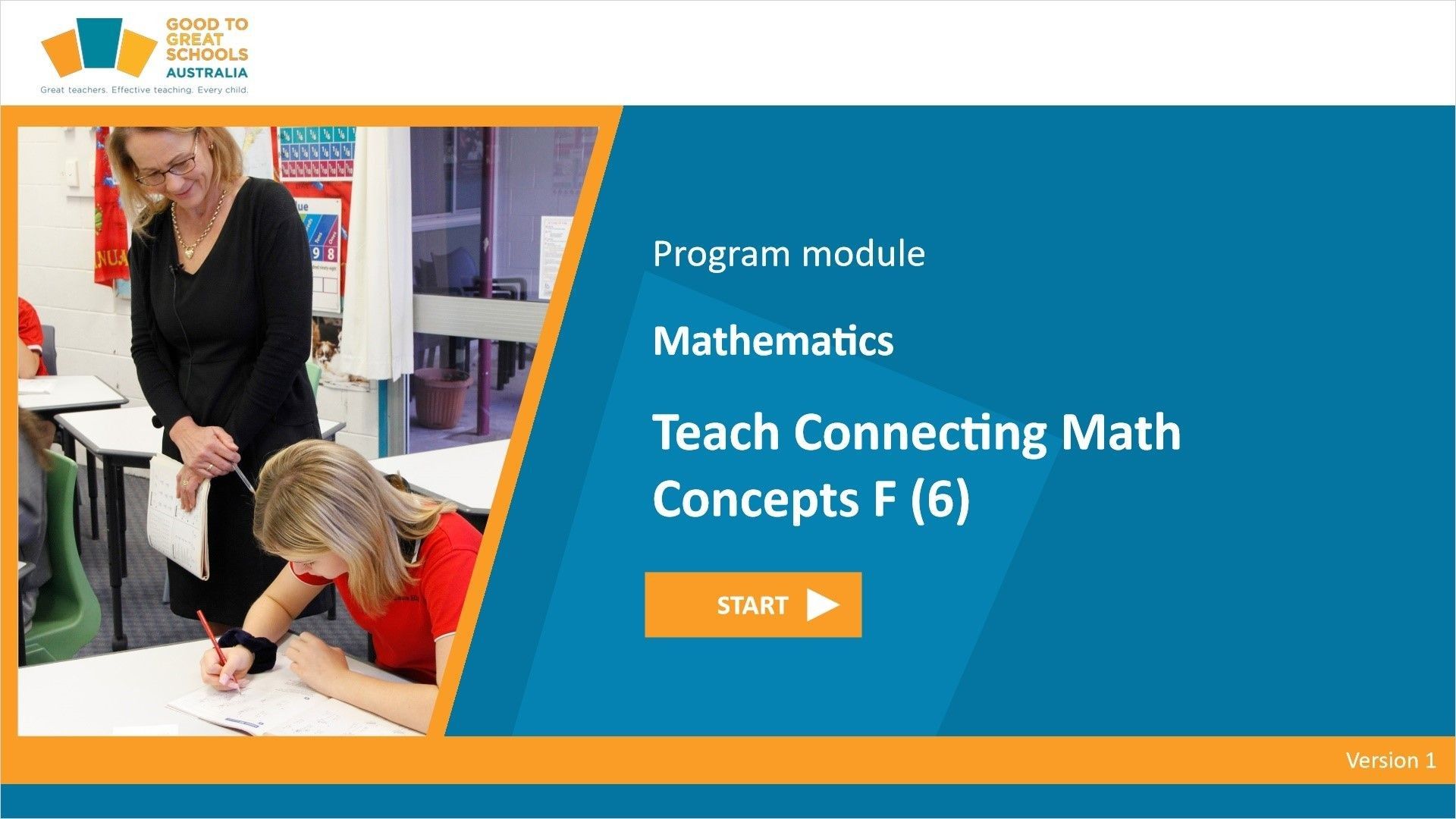
Teach Connecting Math Concepts F (6)
Learning Intents
- Use instructional program scope and sequence charts to set learning goals that provide scaffolding and incremental challenges for students appropriate to their ability and goals (3.1.01).
- Implement lesson sequences with fidelity using knowledge of student learning, content and effective teaching strategies (3.1.02).
- Select and implement a variety of effective teaching strategies. Participate in program practice sessions to master teaching strategies (3.1.03).
- Demonstrate knowledge of effective teaching resources that are aligned with the core programs and further engage students in their learning (3.1.04).
- Incorporate feedback based on observations to implement and improve a range of verbal and non-verbal communication strategies to support student engagement during small-group instruction (3.1.05).
- Implement re-teaching or skipping of direct instruction lessons based on group mastery data and in collaboration with instruction coach. Review direct instruction student mastery data daily to ensure groups stay at mastery (3.1.08).
- Implement lesson sequences with fidelity, maintaining student engagement and promoting learning.
- Review student work daily to ensure all students are at mastery (3.1.09).
- Implement effective teaching techniques to develop problem-solving skills in students (3.1.10).
- Demonstrate knowledge of effective teaching strategies and practices (3.2.01).
- Understand the underlying organisational principles of mastery learning programs (3.2.02).
- Use curriculum, assessment and reporting knowledge to collect student mastery data for analysis during problem-solving sessions (3.2.03).
- Know and understand effective teaching strategies for developing strong literacy and numeracy skills for all students (3.2.05).
- Implement all parts of direct and explicit instruction lessons (3.2.07).
- Plan group instruction based on mastery data and program guidelines. Implement direct and explicit instruction lessons with fidelity (3.2.08).
- Understand how to group students and maximise instructional time to manage classroom activities. Apply classroom practices across all activities by setting clear behavioural expectations and facilitating routines, orderly transitions and bell-to-bell teaching (3.4.02).
- Demonstrate knowledge of effective instructional behaviour strategies. Use evidence-based practices to support positive behaviour (3.4.03).
- Demonstrate understanding of how to use feedback during the implementation of Effective Instruction curricula as well as in-program Mastery Tests to assess student learning program decisions (3.6.01).
- Demonstrate an understanding of the purpose of providing timely and appropriate feedback to students about their learning during instruction and independent work by using appropriate corrective feedback and effective teaching procedures for diagnosis and remediation of curriculum-related skills (3.6.02).
- Demonstrate understanding of objective assessment anchored to the implementation of effective teaching curricula and its application to support consistent and comparable judgements of student learning (3.6.03).
- Demonstrate the capacity to interpret student assessment data from informal in-program assessments and related independent progress monitoring to evaluate student learning and modify teaching practice (3.6.04).
- Understand the importance of keeping accurate and reliable records of student achievement (3.6.05).
- Plan instructional time to implement mastery tests as indicated in the program. Implement in-program and out-of-program assessments to evaluate student mastery levels. Review mastery test data to determine individual and group mastery (3.6.06).
Prerequisite
- Learn Effective Teaching Essentials
- Deliver Direct Instruction.
Duration
- 12 Lessons.
Assessment
Assessment has three stages:
Certification
Participants are eligible for certification based on attendance and completion of assessment requirements for each module.
Other Program Modules
Other Professional Learning Modules
Curriculum Units
